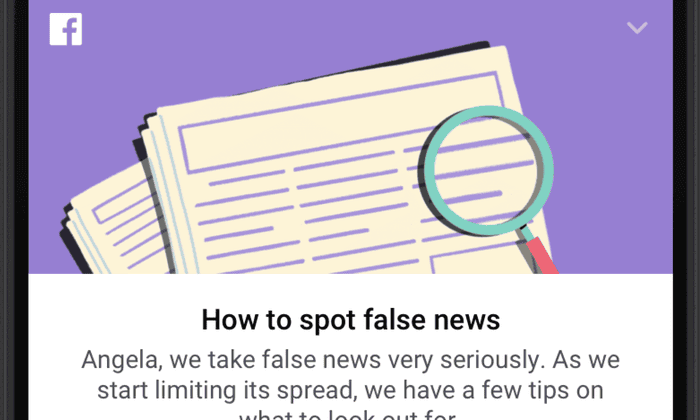
This article discusses how millions of Facebook users will soon be offered tips for spotting fake news as part of the social network’s latest attempt to address concerns about its role in the spread of false information. There will be a new “educational tool”, a “signals” tracker for user behaviour and third-party fact checkers to make misinformation less prominent on the social network. Facebook will now be using third-party fact checkers such as Snopes and PolitiFact to limit the spread of stories. However, signals which will affect the ranking of articles in the news feed, such as whether a someone is less likely to share a story after they have read it, could affect legitimate publishers including established newspapers, as well as controversial digital outlets such as rightwing US site Breitbart. There will be a large post at the top of users feeds with messages such as “it is possible to spot false news” and links to 10 tips for identifying misinformation including checking web addresses and being skeptical about headlines which make shocking claims. According to the article educational measures are necessary to help people evaluate fake news that made it into news feeds while also encouraging a more critical approach towards certain articles, Facebook has defined fake news as "articles that set out to deceive, contain objectively provable falsehoods and pretend to be from a “legitimate” news site". The social networking site has recently been criticised for being slow to take responsibility for its role in spreading misinformation, for example during the US election when fabricated stories about Donald Trump and Hillary Clinton were read and shared by millions. Governments have also indicated a willingness to ensure technology companies take more responsibility for the what appears on their platforms. For example, the German chancellor, Angela Merkel backed legislation that could lead to fines of up to €50m if social networks refuse to remove illegal content or don’t give users an effective way to report hate speech and fake news.
From reading this article it is clear that Facebook is attempting to defeat their issue of fake news with effective approaches. I believe that by educating users it will have a greater impact and that this would work well alongside with the third party features.

I believe that the BBC should continue to report impartially and that although politics is inevitably linked to the news it should not have such a great impact on it. The letters are both interesting in demonstrating the impact of the news on Brexit and how it has shaped current events.
No comments:
Post a Comment